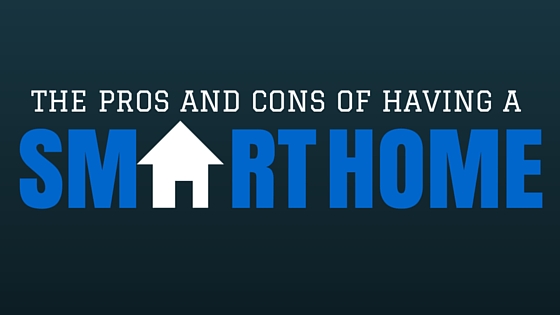The Pros and Cons of Having A Smart Home

Download this episode:
More than a quarter of Americans have smart home products and they report that the devices save them an average of 30 minutes a day and more than $1,000 per year, according to a recent report by Coldwell Banker and CNET.
But what exactly makes a home “smart”? Are the savings and the convenience worth the cost? In this episode, we discuss what you need to know about this growing industry, what exactly constitutes a smart home, and what the pros and cons are of having one.
What is a smart home?
A smart home is one that includes smart devices intended to make your home safer, more efficient, and more comfortable. These devices are part of the Internet of Things, which experts estimate will contain nearly 50 billion objects by 2020. Learn more about the Internet of Things and its risks.
Types of technology you can install to save money and make your home a smart home include:
- Smart thermostats
- Water-leak detectors
- Security cameras
- Window and door sensors
Pros of having smart devices in your home
1. They can help homeowners prevent and minimize damage.
- Smart thermostats can help prevent pipes from freezing.
- Smart-leak detectors can shut off water if they detect moisture.
- Smart smoke and carbon monoxide detectors can notify you through an app and potentially save your life and your home.
2. They’re convenient for those who are aging, disabled or have limited mobility.
- Smart locks can alleviate the common problem of being locked out due to lost or forgotten keys.
- Smart lighting systems can “learn” your patterns and switch lights on and off at appropriate times.
- Home healthcare equipment, such as monitoring and diagnostic tools, can simplify the caregiving process. For example, some sensors and devices may help you monitor the movements of an aging or disabled relative and ensure their safety.
3. They can provide additional security resources.
- Advanced security systems can notify you through an app on your smartphone if there’s an intrusion
- By adding a security system and cameras, you may also detect vehicles approaching your home, automatically lock doors, get room-by-room surveillance, etc.
4. There is the potential for lower energy bills.
- Smart thermostats are expected to be one of the most common connected home devices in the next five years.
- People are often concerned with saving on their heating and cooling bills.
- Smart thermostats can create energy-saving schedules that can reduce energy consumption for heating and cooling by up to 30%.
5. Some insurance companies reward you for having smart devices.
- State Farm and Allstate are among the few insurance companies who offer some sort of discount for smart security and monitoring devices.
- As the smart device market grows, more insurance companies are likely to give discounts. Talk to your trusted insurance agent about what discounts are available to you.
Cons of having smart devices in your home
1. It’s difficult to link systems from different vendors.
- Many manufacturers develop disctinct systems, making it difficult to integrate new devices with your existing ones made by a different brand.
- Integrating different devices from different vendors may result in limited functionality and unreliable service.
2. The systems can be costly.
- The market is expanding and costs are decreasing, but many systems still come with a hefty price tag.
- Most devices cost several hundred dollars each; the cost of a complete home upgrade could be thousands of dollars.
3. These devices have security flaws and can be hacked.
- In early 2015, one tech company tested 16 home automation devices and found only one that its researchers couldn’t easily break into.
- Some companies that make these products don’t have strong backgrounds in security.
- There are currently no industry standards for security on these devices.
- If cyber criminals breaks into your home devices, they can learn your patterns of behavior and use that to their advantage. Learn more about how smart homes are hacked.
How to keep your smart home secure
Only buy products made by companies you trust. Don’t overlook security for convenience.
Treat your smart home products likes any other computer. Update the software whenever updates are made available. Choose strong passwords and change them regularly.


